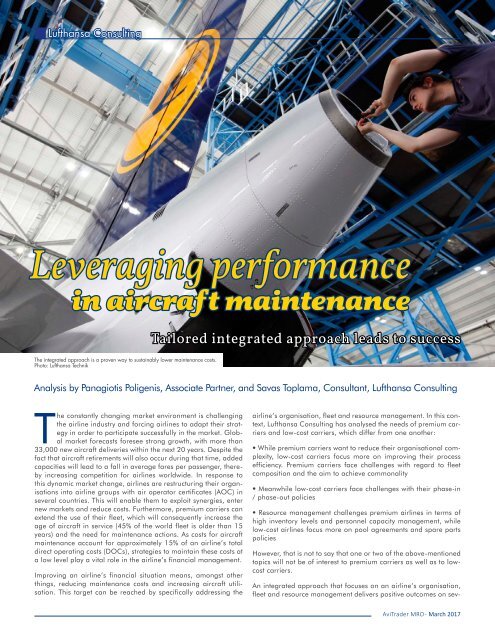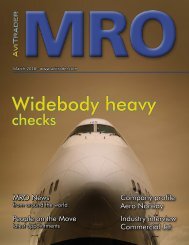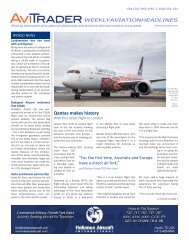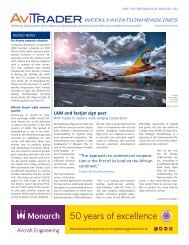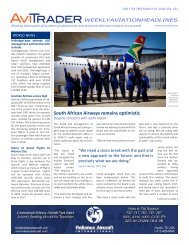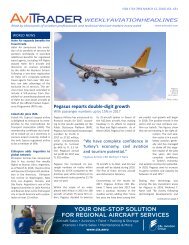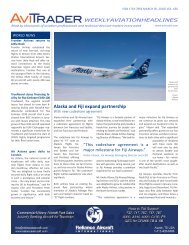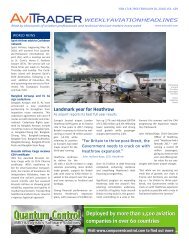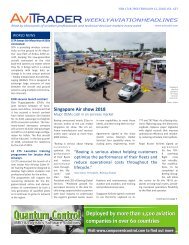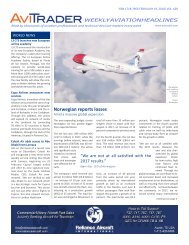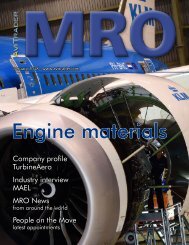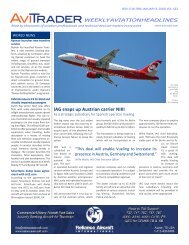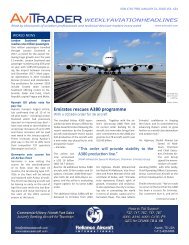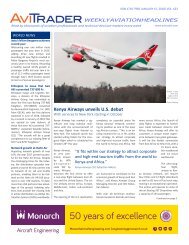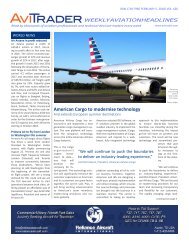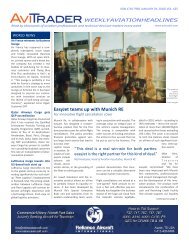AviTrader MRO Magazine 2017-03
AviTrader MRO Magazine 2017-03
AviTrader MRO Magazine 2017-03
Create successful ePaper yourself
Turn your PDF publications into a flip-book with our unique Google optimized e-Paper software.
Lufthansa Consulting<br />
28<br />
Leveraging performance<br />
in aircraft maintenance<br />
Tailored integrated approach leads to success<br />
The integrated approach is a proven way to sustainably lower maintenance costs.<br />
Photo: Lufthansa Technik<br />
Analysis by Panagiotis Poligenis, Associate Partner, and Savas Toplama, Consultant, Lufthansa Consulting<br />
The constantly changing market environment is challenging<br />
the airline industry and forcing airlines to adapt their strategy<br />
in order to participate successfully in the market. Global<br />
market forecasts foresee strong growth, with more than<br />
33,000 new aircraft deliveries within the next 20 years. Despite the<br />
fact that aircraft retirements will also occur during that time, added<br />
capacities will lead to a fall in average fares per passenger, thereby<br />
increasing competition for airlines worldwide. In response to<br />
this dynamic market change, airlines are restructuring their organisations<br />
into airline groups with air operator certificates (AOC) in<br />
several countries. This will enable them to exploit synergies, enter<br />
new markets and reduce costs. Furthermore, premium carriers can<br />
extend the use of their fleet, which will consequently increase the<br />
age of aircraft in service (45% of the world fleet is older than 15<br />
years) and the need for maintenance actions. As costs for aircraft<br />
maintenance account for approximately 15% of an airline’s total<br />
direct operating costs (DOCs), strategies to maintain these costs at<br />
a low level play a vital role in the airline’s financial management.<br />
Improving an airline’s financial situation means, amongst other<br />
things, reducing maintenance costs and increasing aircraft utilisation.<br />
This target can be reached by specifically addressing the<br />
airline’s organisation, fleet and resource management. In this context,<br />
Lufthansa Consulting has analysed the needs of premium carriers<br />
and low-cost carriers, which differ from one another:<br />
• While premium carriers want to reduce their organisational complexity,<br />
low-cost carriers focus more on improving their process<br />
efficiency. Premium carriers face challenges with regard to fleet<br />
composition and the aim to achieve commonality<br />
• Meanwhile low-cost carriers face challenges with their phase-in<br />
/ phase-out policies<br />
• Resource management challenges premium airlines in terms of<br />
high inventory levels and personnel capacity management, while<br />
low-cost airlines focus more on pool agreements and spare parts<br />
policies<br />
However, that is not to say that one or two of the above-mentioned<br />
topics will not be of interest to premium carriers as well as to lowcost<br />
carriers.<br />
An integrated approach that focuses on an airline’s organisation,<br />
fleet and resource management delivers positive outcomes on sev-<br />
<strong>AviTrader</strong> <strong>MRO</strong> - March <strong>2017</strong>


